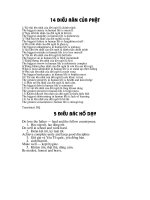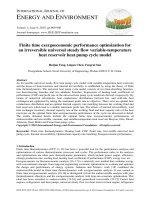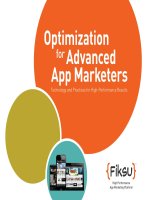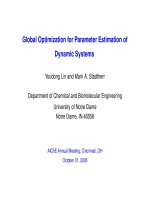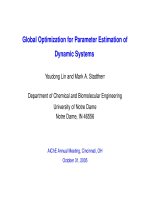optimization for advanced app marketers
Bạn đang xem bản rút gọn của tài liệu. Xem và tải ngay bản đầy đủ của tài liệu tại đây (3.6 MB, 22 trang )
High Performance
App Marketing Platform
Optimization
Advanced
App Marketers
for
Technology and Practices for High-Performance Results
2 | | www.fiksu.com/ebooks
As a mobile app marketer, choosing the right media
sources to promote your app is too much of a guessing
game. As you plan your campaign, there’s no sure way of
knowing which ad networks will cost-effectively deliver the
largest number of installs, which will drive loyal users you
can monetize, and which will merely drain your budget.
You have limited insights on which to base your media
buys. Mobile ad targeting is not as sophisticated as what
you may be used to in the online marketing world.
This is why optimization technology is so crucial to mobile
app marketing. With optimization technology, you can gain
detailed and immediate insights into the advertising that’s
driving your business, and optimize on those insights early
and often during the campaign, to deliver the price/perfor-
mance results you need.
This ebook outlines an optimization technology for mobile
app marketing that automates the optimization process,
is simple to implement, and is already generating
exceptional results for leading mobile app businesses.
3 | | www.fiksu.com/ebooks
There are three ways app marketers typically optimize their ad campaigns:
1. Network-Managed Optimization
As ad campaigns run, the networks periodically pull data to identify the
publishers (apps) that are driving downloads. The networks optimize the
campaign by removing the publishers that aren’t delivering downloads,
and by increasing the buys with the publishers that are driving downloads.
This optimization is performed with varying degrees of interaction with the
advertiser.
While this occurs, the advertiser may also compare performance between
networks, outlined in #2 below.
2. Advertiser-Driven Optimization Between Networks
The advertiser compares results between networks, to identify the networks
that are performing well, and those that are not. The advertiser conducts
data analysis based on reports from the different networks, and allocates
more budget to the high-performing networks, and less budget to the
low-performing networks.
What’s wrong with these approaches?
With advertiser-driven optimization between networks, the advertiser must
consolidate multiple network reports, each with unique formats and with
differing information. This is time consuming and difficult because each net
Why Traditional Optimization
Approaches Fall Short
4 | | www.fiksu.com/ebooks
work provides a different type of report, tracking different types of data. For example, some networks report that
a download occurs on the day an ad is displayed. Others report when the app was physically opened the first time.
Data is reported differently from network to network, and somehow the advertiser needs to reconcile this. It can take
an enormous amount of manual spreadsheet work to consolidate all of these reports and, without the ability to do so,
it is difficult to identify the best value for the ad spend.
An even bigger issue with both approaches is that ad networks typically optimize only to downloads. Most networks
are not able to optimize ad spend to the publishers that drive the users that take the high-value actions that your
business values – such as purchases or repeat launches. They’re focused primarily on optimizing to downloads.
Unfortunately, downloads often don’t convert into productive users. A large proportion of apps are used only once
or twice. This is why it’s crucial to:
n Track the post-download events, such as purchases, repeat engagement, game levels, etc. that are important
to your business and;
n Optimize to the sources driving the users who take these post-download actions because they are the loyal
users that drive your business.
Ad networks are focused primarily on ads and clicks. So it needs to be up to you as an advertiser to be pro-active
about tying post-download events back to the media source and optimizing to these sources. Many app marketers
have recognized the need to optimize to the sources driving loyal users. Some have tried to address this optimization
quality concern through the following optimization method.
3. Attribution of Post-Download Events with Standalone Ad Tracking Products
Some advertisers have tried to address optimization quality by either purchasing or building standalone ad
tracking (attribution) technology to consolidate reporting in a common format and, in some cases, to attribute
post-download events back to the media source.
5 | | www.fiksu.com/ebooks
The process works like this:
As campaigns run, the ad tracking software attributes downloads, and
possibly also post-download user actions (i.e., purchases, repeat launches)
to the media source.
The advertiser performs analysis by reviewing results within the tracking
software dashboard, or by creating spreadsheets from the dashboard and
conducting data analysis to draw conclusions. This can potentially involve
tens of thousands of data points. This step can be very time consuming and
complex because it is manual.
The advertiser identifies potential top-performing sources and poorly
performing sources.
The advertiser contacts the networks to request changes to the media buy
or enters changes in network interfaces. This process varies from network
to network and can also involve significant manual effort.
6 | | www.fiksu.com/ebooks
Sounds easy.
In theory, it is. But in practice,
marketers have found that this
approach is fraught with challenges
7 | | www.fiksu.com/ebooks
* Performance data by publisher is available from select networks.
Challenge #1:
It’s extremely labor intensive.
Tracking solutions provide raw data. Therefore, it’s entirely up to the advertiser to make
something of this data.
Consider a sample advertising program with:
• 5 ad creatives
• 4 ad creative sizes
• Running on 3 networks
• With thousands of publishers per network*
• In 10 countries
• On 3 devices
• On 2 operating systems
For the best possible optimization, the data analysis must be as granular as
possible. For example, Japan may be the country driving the most downloads,
but in what combinations?
For example, is it:
• Creative A, 720 x 90, on Network 1, xxx Publishers, on Device 1?
• Or is it Creative B, 320 x 50, on Network 2, xxx Publishers, on OS 1?
• Or could it be Creative C, 300 x 250, on Network 3, xxx Publishers, on Device 2, OS 2?
COUNTRY
?
DEVICE
?
8 | | www.fiksu.com/ebooks
OPERATING
SYSTEM
PUBLISHER
NETWORK
And there are additional variables to consider, such as all countries, day of week,
cost-per-install, rank and more.
Now multiply this by thousands of potential combinations and the challenge is clear.
For quality optimization, advertisers must consider all these combinations to identify
what’s truly driving business, and what isn’t.
To achieve optimal ad spend, app marketers are taking this granular approach
to optimization. But it’s nearly impossible to do so through manual analysis that is
required when using standalone ad tracking products or through network dashboards.
?
?
?
CREATIVE
?
9 | | www.fiksu.com/ebooks
Challenge #2:
Optimization is delayed.
Data obtained through the ad tracking software or through network dashboards is not actionable
immediately, due to the manual nature of the data analysis. There are no algorithms that make
optimization decisions, such as what media is most cost-effective, how to bid, or how to manage
volume and budget. Nor is there any infrastructure to execute on these decisions. It’s up to
marketing staff to do their best to draw conclusions from massive amounts of data and implement
optimization decisions according to the processes of each network.
This manual optimization process can take several days or longer, particularly when working with
multiple networks. Each day of
optimization lag
leads to another day of less than optimal ad spend
and compromised performance.
ON HOLD
ON HOLD
ON HOLD
ON HOLD
10 | | www.fiksu.com/ebooks
Optimization decisions can be applied only to networks on which campaigns are running.
With ad tracking products, there is no systematic way to apply performance insights to
potential new media sources with high potential to perform well. It’s important to be able
to apply performance insights to new ad networks and real-time bidding exchanges that
should perform well, to expand your marketing reach.
In addition, ad tracking products typically employ one type of attribution technology, such
as HTML cookie tracking or digital fingerprinting. Some ad networks may not support a
particular attribution technology, thereby limiting the ability to gain performance insights
on which to optimize.
Marketers Are “Settling”
What many app marketers have found with ad tracking products is that, although they do
provide a greater level of performance insights than most ad networks, it’s still a manual,
time-consuming and limiting approach. Most marketers either don’t have the time,
the expertise, or the tools to efficiently turn these insights into the best possible optimization
decisions – so they end up settling.
Challenge #3:
Optimization options are limited.
11 | | www.fiksu.com/ebooks
App marketers who need to deliver measurable results have identified
5 characteristics of high-performance optimization:
1. Optimizes on Post-Download Events
Provides the ability to optimize on post-download events, such as in-app
purchases and repeat launches. This helps ensure that media spend is
allocated to the sources that are truly driving business results.
2. Integrates Attribution with Optimization
By integrating attribution with optimization technology, marketers can
react quickly to the performance insights gained through attribution.
This integrated approach delivers more value because attribution insights
are actionable immediately, without the delay caused by manual analysis.
3. Enables the Ability to “Get Granular” with “Big Data”
When tracking and analyzing post-download events, there are enormous
amounts of data that need to be considered to arrive at the best optimization
decisions. And it’s crucial to analyze all this data quickly, and at the most
granular level to zero in on the best performance drivers.
The 5 Characteristics of
High-Performance Optimization
12 | | www.fiksu.com/ebooks
4. Enables Broad Media Deployment
Optimization decisions can be deployed beyond existing media sources –
to new media sources that are highly likely to perform well.
5. Provides Immediate and Continuous Optimization
Optimization is not a one-time event. To achieve the best possible
price/performance results, optimization must be early and often.
As advertising dynamics change, the optimization needs to be in
lockstep with these evolving performance changes to deliver the
best possible results.
These cannot be performed manually.
They require technology.
Today, many mobile app marketers are benefitting from these capabilities,
with a mobile app marketing and optimization technology from Fiksu.
Hundreds of app marketers have completely automated and integrated their
attribution, optimization and media buying all in one real-time solution that
delivers exceptional price/performance results.
13 | | www.fiksu.com/ebooks
Fiksu is a mobile app marketing platform that combines attribution and optimization technology with central-
ized media buying from the world’s largest mobile app media inventory. By combining these capabilities into
one technology solution, app marketers are able to confidently deploy their ad dollars on the media sources that
perform best and deliver true business results.
Fiksu removes the complexity and limitations of manual optimization, by automating and integrating the entire
optimization process, with a focus on optimization quality, efficiency and performance.
The Fiksu Platform employs three primary technologies that work together to drive optimization performance:
Fiksu Mobile App Marketing Platform with
Optimized Marketing Performance
Integrated Post-Download
Event Attribution
Automated Optimization
Engine
Broad and Real-time
Media Buying
14 | | www.fiksu.com/ebooks
1. Integrated Post-Download Event Attribution
The Fiksu Mobile App Marketing Platform automates attribution of downloads
plus
post-download events,
enabling marketers to optimize to the sources that drive ROI.
As campaigns run, Fiksu records post-download user actions (in-app purchases, repeat launches,
game levels and more), and attributes each of these actions back to the media source, ad creative and
other campaign elements, to identify the sources of high-value, loyal users. This information is updated
in real-time and available for viewing in Fiksu’s online dashboard. Because Fiksu integrates attribution
and optimization technologies, this attribution data is fed into Fiksu’s optimization engine automatically
and continuously. This unique integration of attribution and optimization technology makes attribution data
actionable immediately and continuously, to make the attribution data truly impactful, and to deliver the
best possible results.
2. Automated Optimization Technology
As Fiksu attributes users’ post download events, Fiksu feeds this attribution data into its optimization
engine in real time. Fiksu’s optimization engine rapidly analyzes the performance of every possible
campaign variable (ad source, creative, country, location, device, operating system, day, time, cost and
more) in every possible combination, and isolates the best performing media sources and campaign
attributes based on the advertiser’s specific user acquisition goals.
Fiksu’s attributes more than
150 million post-download events per day.
15 | | www.fiksu.com/ebooks
Fiksu’s optimization engine analyzes a virtually unlimited number of combinations of variables, to identify
the combinations of media source, ad creative and other variables that deliver most effectively on
acquisition, cost and ROI goals.
Fiksu applies this intelligence automatically and continuously to marketing programs to ensure the most
productive ad spend and best user acquisition results.
“Smart Allocation” determines the best spending combinations in real time
Fiksu’s optimization technology systematically identifies the most economically efficient ad options.
Fiksu algorithms leverage conversion data to determine an expected conversion rate for each
combination of ad variables. These conversion rates are then weighed against the expected ad cost
(the bid) and turned into an expected value for each transaction. Fiksu identifies the best ad choices
and then allocates ad spending to ensure volume goals are met while minimizing cost and generating
the best possible ROI.
In addition, because the Fiksu Platform employs tight integrations with a number of leading networks,
Fiksu can measure performance and optimize at the publisher level. This enables much more targeted
optimization that often is not available to advertisers.
16 | | www.fiksu.com/ebooks
Store Optimization Drives Organic Users
Achieving a high rank in the stores can be extremely expensive. The Fiksu Platform continually monitors
the relationship between ad spend and an app’s rank to optimize campaigns to deliver the rank that
delivers the most organic users at the best cost. Rather than simply focusing on getting the highest
possible rank, Fiksu’s platform determines an app’s optimal rank level. Some apps get no more organic
users at a rank of 10 than 20. So why pay to achieve a ranking of 10 when a rank of 20 delivers the same
number of organic users for a lower cost? Fiksu identifies the optimal rank and optimizes to attain that
rank. By closely monitoring rank behaviors during a live campaign, Fiksu can optimize ad spend to
achieve the rank that yields the best ROI.
Optimization on Real-Time Bidding Exchanges
Fiksu’s optimization algorithms are also integrated with the leading real-time bidding exchanges,
which offer highly targetable ad traffic through real time bidding auctions. These exchanges provide an
opportunity for acquiring users in a highly efficient, cost effective manner. Fiksu’s high-speed, intelligent
infrastructure enables access to this highly effective, growing pool of impression-based media.
• Employs rank and discovery methods specific to each store
• Drives the most efficient rank
• Delivers the most organic users
Exceptional Store Optimization
for Increased Visibility
17 | | www.fiksu.com/ebooks
3. Broad and Real-Time Media Buying
Fiksu is integrated with over 45 ad networks and real-time bidding exchanges
representing more than 95% of the available impressions in the market. It is
this broad and real-time media buying integration that gives app marketers
a unique and significant optimization algorithms:
n Continuously analyze the impressions within this additional
universe of potential new media sources
n Identify focused pockets of impressions that match the
campaign’s conversion and ROI performance models, and
n Execute highly-optimized buys on these new media sources
This broad media reach helps marketers avoid audience saturation that often
occurs when running on a limited number of media sources, and also extends
the lifetime of campaigns while maintaining high install volumes without
seeing a dip in price/performance results.
MEDIA
MEDIA
MEDIA
MEDIA
MEDIA
FIKSU
OPTIMIZATION
18 | | www.fiksu.com/ebooks
Optimization is critical component of any mobile app marketing
program. Unfortunately, some marketers treat optimization as an
afterthought. As their campaigns run and they see that they’re not
getting the results they had hoped for, they scramble to figure out
how to optimize.
Optimization strategy must be a key component of your advertising
planning process. As you plan your app marketing program,
ask yourself these questions:
Optimization is Strategic
and Critical To Your Success
19 | | www.fiksu.com/ebooks
n What are the post-download events that are critical to my business?
n Do I have the ability to attribute these events to the media source and other
campaign variables?
n Does my staff have the infrastructure, expertise, tools and bandwidth to conduct
the necessary attribution analysis on which to base optimization decisions?
n How do I execute the optimization decisions in real time and continually,
to deliver the best possible results?
n Is my optimization limited to the media sources running my campaign, or can
my optimization identify new media sources that will perform well?
n Will I conduct attribution and optimization manually, or will I automate
the process?
20 | | www.fiksu.com/ebooks
Fiksu Optimization
Delivers Results
No other optimization approach is
as intelligent and effective as
Fiksu Optimization.
The Fiksu Platform’s integrated and automated approach
to attribution, optimization and media buying helps app
marketers gain more value from attribution intelligence,
focus ad dollars on the best performing media sources,
and achieve the best possible marketing performance.
Learn how you can join the community of
high-performance app marketers using Fiksu.
1.855.463.4578
www.fiksu.com
Copyright © 2012 Fiksu. All rights reserved. Fiksu and Fluent News are registered trademarks and the
Fiksu logo is a trademark of Fiksu, Inc. Apple and the App Store are registered trademarks of Apple, Inc.
All other trademarks mentioned herein are the property of their respective holders.
Fiksu, Inc.
101 Arch Street, Suite 304
Boston, MA 02110
Phone: 855-463-4578
Email:
Fiksu, Inc.
32 Percy Street
London, UK
W1T 2DE
Phone: +44 (0) 203-585-3412
Email:
Fiksu, Inc.
137 Amoy Street
#02-01 Far East Square
Singapore 049965
Phone: +65 6372 9538
Email:
US Office UK Office
Singapore Office
Phone: 1.855.463.4578 | Email: | Website: www.fiksu.com
High Performance
App Marketing Platform

